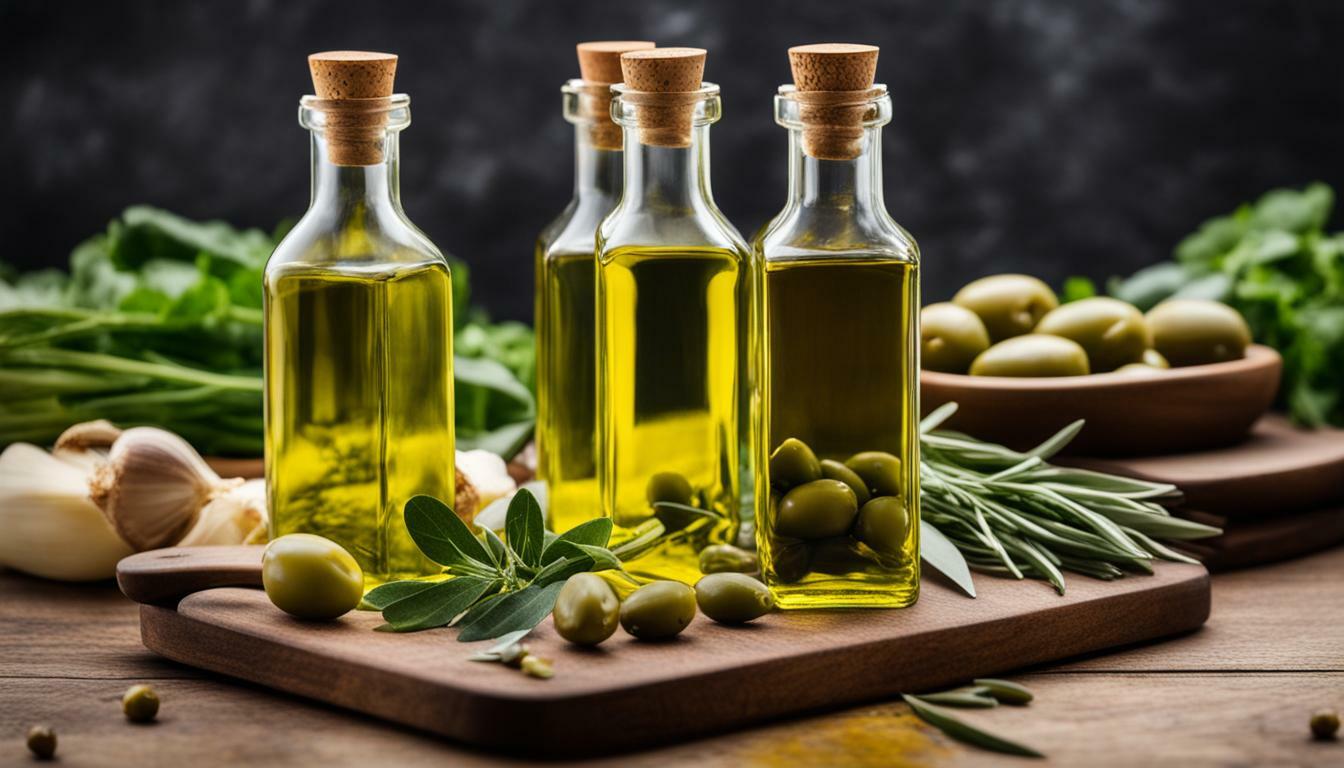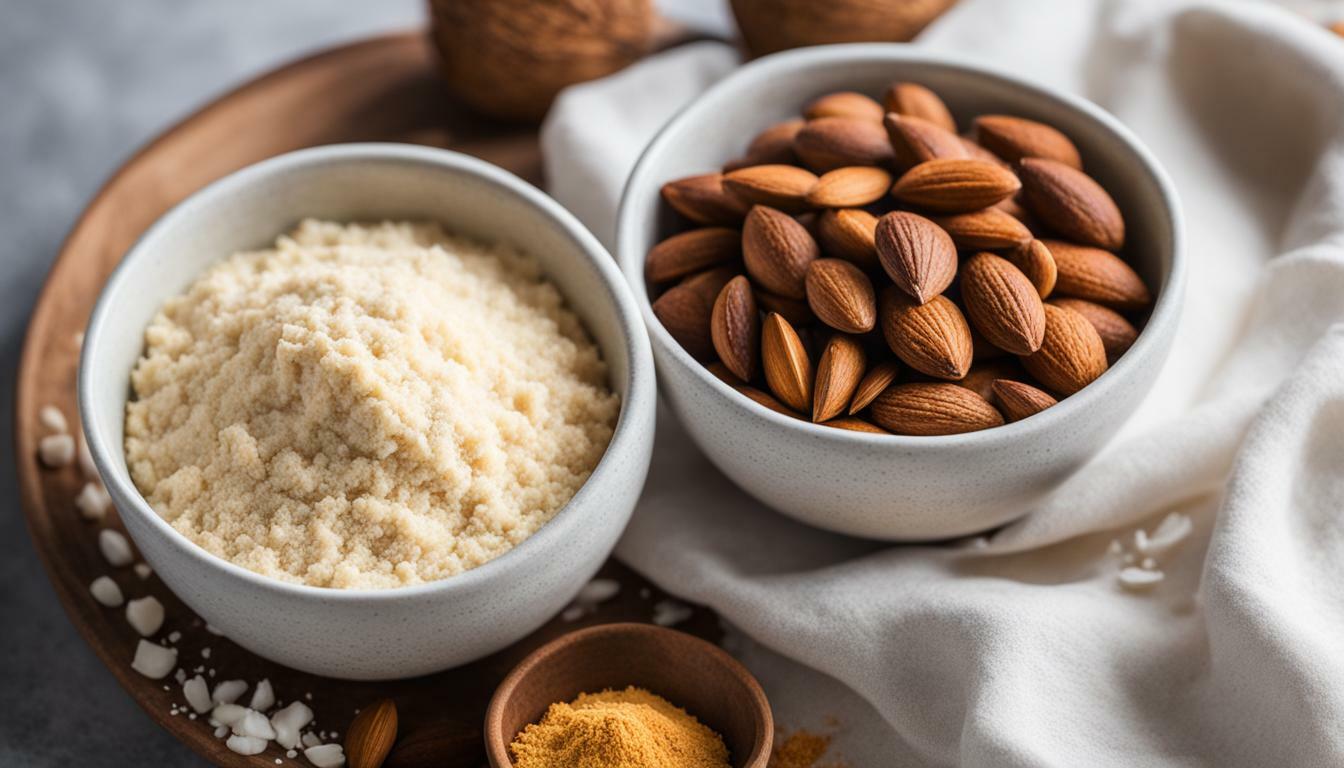If you’ve ever found yourself confused about the differences between olive oil and canola oil, you’re not alone. While both oils are commonly used in cooking, they have distinct qualities that set them apart.
Olive oil has been a staple in Mediterranean diets for centuries and is known for its fruity, pungent flavor. Canola oil, on the other hand, is a newer oil that was developed in the 1970s and is derived from rapeseed.
In terms of processing methods, olive oil is typically cold-pressed, while canola oil is usually extracted using high heat and solvents. This affects the nutritional profiles of the oils, as well as their smoke points and suitability for different cooking methods.
So, what are the main differences between olive oil and canola oil when it comes to nutrition and cooking? Read on to find out.
Key Takeaways:
- Olive oil and canola oil have distinct differences in origin, processing, and culinary uses
- Olive oil is known for its fruity flavor, while canola oil is milder and more neutral in taste
- The nutritional profiles of the oils differ in terms of fat composition, vitamin E content, and potential health benefits
- Smoke point and suitability for different cooking methods should also be taken into consideration when choosing which oil to use
Health Benefits of Olive Oil
Olive oil has been a staple in the Mediterranean diet for centuries, and for good reason. The health benefits of olive oil are numerous and have been widely studied.
Antioxidant Properties
Olive oil is high in antioxidants, specifically a group of compounds called polyphenols. These antioxidants have been shown to have anti-inflammatory effects and protect against oxidative damage, which can contribute to several chronic diseases.
Heart-Healthy Fats
Olive oil is rich in monounsaturated fatty acids, which have been shown to improve heart health by reducing LDL cholesterol levels and improving blood vessel function. A diet high in monounsaturated fats, like those found in olive oil, has also been associated with a lower risk of cardiovascular disease.
Potential Anti-Inflammatory Effects
Some studies suggest that the polyphenols in olive oil may have anti-inflammatory effects in the body, which can help reduce the risk of chronic diseases, such as cancer and type 2 diabetes.
Supports Brain Health
The monounsaturated fatty acids in olive oil have been shown to improve cognitive function and may help reduce the risk of age-related cognitive decline.
Reduces the Risk of Chronic Diseases
Studies have shown that a diet rich in olive oil may help reduce the risk of chronic diseases, including cardiovascular disease, cancer, and Alzheimer’s disease. The anti-inflammatory and antioxidant properties of olive oil may contribute to these benefits.
Overall, the health benefits of olive oil are undeniable. Incorporating olive oil into your diet can be a simple and delicious way to improve your health and reduce the risk of chronic diseases.
Culinary Uses of Olive Oil
Olive oil is a highly versatile ingredient that can be used in a variety of culinary applications. It is prized for its distinct flavor and health benefits, making it a popular choice for many home cooks and professional chefs.
One of the primary uses of olive oil is in cooking. It is a great option for sautéing vegetables, frying eggs, and roasting meats and fish. Olive oil has a high smoke point, which means it can be heated to high temperatures without burning or smoking.
Another popular use for olive oil is as a dressing for salads and other dishes. Extra virgin olive oil, which is the highest quality of olive oil, has a rich and fruity flavor that pairs well with a variety of ingredients. It can be drizzled over salads, pasta dishes, and even bread for a delicious and healthy finishing touch.
When selecting olive oil for cooking or drizzling, it is important to consider the flavor profile of the oil. Some olive oils have a mild taste, while others are more robust and peppery. It is a good idea to experiment with different types of olive oil to find the one that best suits your tastes and the dishes you are preparing.
Canola oil, on the other hand, is a popular oil for frying due to its high smoke point. It is also a good option for baking and other applications where a neutral flavor is desired. However, canola oil does not have the same health benefits as olive oil, as it is not a significant source of antioxidants or heart-healthy fats.
In summary, olive oil is a highly versatile and healthy ingredient that can be used in a variety of culinary applications. From cooking to drizzling, it adds flavor and nutrition to a wide range of dishes. While canola oil has its own uses, it cannot match the unique qualities of olive oil.
Nutritional Comparison: Olive Oil vs. Canola Oil
When it comes to selecting oils for cooking, it’s important to consider their nutritional profiles. Let’s take a closer look at the differences between olive oil and canola oil.
| Nutrient | Olive Oil (1 tbsp) | Canola Oil (1 tbsp) |
|---|---|---|
| Calories | 120 | 124 |
| Total Fat | 14g | 14g |
| Saturated Fat | 2g | 1g |
| Monounsaturated Fat | 10g | 8g |
| Polyunsaturated Fat | 2g | 4g |
| Vitamin E | 2mg | 2mg |
| Smoke Point | 375°F | 400-450°F |
As we can see from the table above, olive oil and canola oil have similar calorie and fat contents. However, there are key differences in their fatty acid compositions. Olive oil is predominantly composed of monounsaturated fats, whereas canola oil contains more polyunsaturated fats. Additionally, olive oil contains more vitamin E than canola oil.
In terms of cooking, both oils have their strengths. Olive oil is best suited for low to medium-heat cooking, such as sautéing and roasting. It’s not recommended for high-heat cooking, such as frying, due to its lower smoke point. Canola oil, on the other hand, has a higher smoke point, making it a better option for frying and other high-heat cooking methods.
Overall, both olive oil and canola oil can be healthy additions to a balanced diet. Choosing the right oil for cooking largely depends on personal preferences and the specific dish being prepared.
Which is Healthier: Olive Oil or Canola Oil?
When it comes to choosing between olive oil and canola oil, the question of which is healthier is a common one. While both oils have their unique qualities, there are some key differences to consider.
Fatty acid composition
Olive oil is predominantly made up of monounsaturated fatty acids (MUFAs), which are a type of healthy fat that has been linked to improved heart health. Canola oil, on the other hand, contains both MUFAs and polyunsaturated fatty acids (PUFAs), which are also healthy fats but can become oxidized when exposed to heat and light.
Antioxidant content
Olive oil is also known for its high antioxidant content, particularly in the form of phenolic compounds. These antioxidants have been shown to have anti-inflammatory effects and may help protect against chronic diseases such as heart disease and cancer. Canola oil, while still beneficial, has a lower antioxidant content in comparison.
Impact on heart health
While both oils have been associated with improved heart health, research suggests that olive oil may have a slight edge. Studies have found that consuming olive oil can help lower cholesterol levels, reduce blood pressure, and improve overall heart function. Canola oil, while still beneficial, may not have these same effects to the same degree.
Conclusion
Ultimately, the decision between olive oil and canola oil comes down to personal preference and individual dietary needs. While olive oil may have a slight edge in terms of its health benefits, both oils can be incorporated into a healthy diet. It’s important to prioritize variety and moderation when it comes to oil consumption, and to choose oils with high-quality sourcing and processing methods for optimal nutritional value.
Closing Thoughts
Overall, both olive oil and canola oil have their unique qualities and benefits. Olive oil contains more health-promoting monounsaturated fats and antioxidants, while canola oil has a higher smoke point and is more neutral in taste.
When it comes to cooking methods, olive oil is a great choice for dressings, marinades, and low to medium heat cooking, such as sautéing and roasting. Canola oil, on the other hand, is better suited for high-heat cooking, such as frying and baking.
Choose Based on Personal Preference and Dietary Needs
The decision between olive oil and canola oil ultimately comes down to personal preferences and dietary needs. Both oils are healthy options when consumed in moderation and as part of a balanced diet.
So, whether you prefer the bold flavor of extra virgin olive oil or the neutral taste of canola oil, feel free to incorporate both into your cooking routine and enjoy the unique benefits of each.
Thank you for reading and happy cooking!
 Skip to main content
Skip to main content


